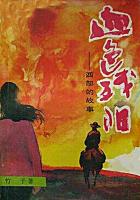The crowd kept increasing in the Rue Buade. The two sturdy beggars who vigorously kept their places on the stone steps of the barrier, or gateway, of the Basse Ville reaped an unusual harvest of the smallest coin--Max Grimau, an old, disabled soldier, in ragged uniform, which he had worn at the defence of Prague under the Marshal de Belleisle, and blind Bartemy, a mendicant born--the former, loud-tongued and importunate, the latter, silent and only holding out a shaking hand for charity. No Finance Minister or Royal Intendant studied more earnestly the problem how to tax the kingdom than Max and Blind Bartemy how to toll the passers-by, and with less success, perhaps.
To-day was a red-letter day for the sturdy beggars, for the news flew fast that an ovation of some popular kind was to be given to the Bourgeois Philibert. The habitans came trooping up the rough mountain-road that leads from the Basse Ville to the Upper Town; and up the long stairs lined with the stalls of Basque pedlars-- cheating, loquacious varlets--which formed a by-way from the lower regions of the Rue de Champlain--a break-neck thoroughfare little liked by the old and asthmatical, but nothing to the sturdy "climbers," as the habitans called the lads of Quebec, or the light- footed lasses who displayed their trim ankles as they flew up the breezy steps to church or market.
Max Grimau and Blind Bartemy had ceased counting their coins. The passers-by came up in still increasing numbers, until the street, from the barrier of the Basse Ville to the Cathedral, was filled with a noisy, good-humored crowd, without an object except to stare at the Golden Dog and a desire to catch a glimpse of the Bourgeois Philibert.
The crowd had become very dense, when a troop of gentlemen rode at full speed into the Rue Buade, and after trying recklessly to force their way through, came to a sudden halt in the midst of the surging mass.
The Intendant, Cadet, and Varin had ridden from Beaumanoir, followed by a train of still flushed guests, who, after a hasty purification, had returned with their host to the city--a noisy troop, loquacious, laughing, shouting, as is the wont of men reckless at all times, and still more defiant when under the influence of wine.
"What is the meaning of this rabble, Cadet?" asked Bigot; "they seem to be no friends of yours. That fellow is wishing you in a hot place!" added Bigot, laughing, as he pointed out a habitan who was shouting "A bas Cadet!"
"Nor friends of yours, either," replied Cadet. "They have not recognized you yet, Bigot. When they do, they will wish you in the hottest place of all!"
The Intendant was not known personally to the habitans as were Cadet, Varin, and the rest. Loud shouts and execrations were freely vented against these as soon as they were recognized.
"Has this rabble waylaid us to insult us?" asked Bigot. "But it can hardly be that they knew of our return to the city to-day." The Intendant began to jerk his horse round impatiently, but without avail.
"Oh, no, your Excellency! it is the rabble which the Governor has summoned to the King's corvee. They are paying their respects to the Golden Dog, which is the idol the mob worships just now. They did not expect us to interrupt their devotions, I fancy."
"The vile moutons! their fleece is not worth the shearing!" exclaimed Bigot angrily, at the mention of the Golden Dog, which, as he glanced upwards, seemed to glare defiantly upon him.
"Clear the way, villains!" cried Bigot loudly, while darting his horse into the crowd. "Plunge that Flanders cart-horse of yours into them, Cadet, and do not spare their toes!"
Cadet's rough disposition chimed well with the Intendant's wish.
"Come on, Varin, and the rest of you," cried he, "give spur, and fight your way through the rabble."
The whole troop plunged madly at the crowd, striking right and left with their heavy hunting-whips. A violent scuffle ensued; many habitans were ridden down, and some of the horsemen dismounted. The Intendant's Gascon blood got furious: he struck heavily, right and left, and many a bleeding tuque marked his track in the crowd.
The habitans recognized him at last, and a tremendous yell burst out. "Long live the Golden Dog! Down with the Friponne!" while the more bold ventured on the cry, "Down with the Intendant and the thieves of the Grand Company!"
Fortunately for the troop of horsemen the habitans were utterly unarmed; but stones began to be thrown, and efforts were made by them, not always unsuccessfully, to pull the riders off of their horses. Poor Jean La Marche's darling child, his favorite violin, was crushed at the first charge. Jean rushed at the Intendant's bridle, and received a blow which levelled him.
The Intendant and all the troop now drew their swords. A bloody catastrophe seemed impending, when the Bourgeois Philibert, seeing the state of affairs, despatched a messenger with tidings to the Castle of St. Louis, and rushed himself into the street amidst the surging crowd, imploring, threatening, and compelling them to give way.
He was soon recognized and cheered by the people; but even his influence might have failed to calm the fiery passions excited by the Intendant's violence, had not the drums of the approaching soldiery suddenly resounded above the noise of the riot. In a few minutes long files of glittering bayonets were seen streaming down the Rue du Fort. Colonel St. Remi rode at their head, forming his troops in position to charge the crowd. The colonel saw at once the state of affairs, and being a man of judgment, commanded peace before resorting to force. He was at once obeyed. The people stood still and in silence. They fell back quietly before the troops.
They had no purpose to resist the authorities--indeed, had no purpose whatever. A way was made by the soldiers, and the Intendant and his friends were extricated from their danger.















